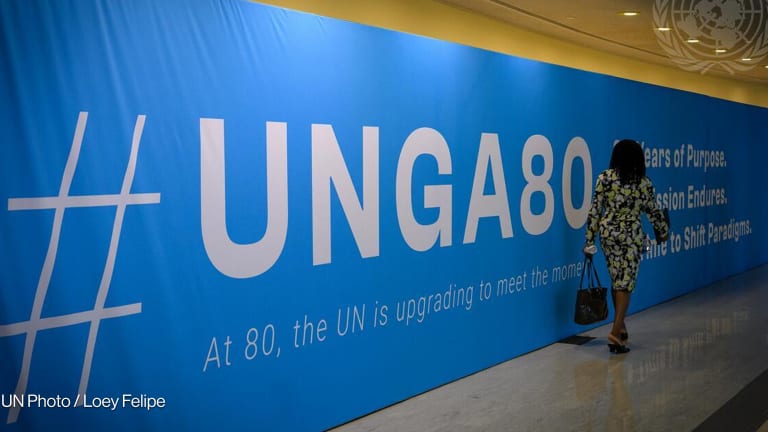Q&A: Kenya's Equity Bank CEO on sustainability, green finance, COP 27
During the United Nations General Assembly in September, Devex sat down with James Mwangi, the chief executive of Equity Group, one of the largest banks in East and Central Africa, to discuss Equity’s approach to climate financing.
During the hustle and bustle of the United Nations General Assembly in September, Devex sat down with James Mwangi, the chief executive of Equity Group, one of the largest banks in East and Central Africa. Mwangi was clear about Equity’s rethinking of the way it finances projects, especially on climate adaptation. He said the bank — which operates in about half a dozen countries in the region — had to adjust their internal and lending processes to be more responsive to climate change. Earlier this year Equity signed an agreement with the International Finance Corporation and other partners including Dutch Development Bank, British International Investment and Symbiotics, and responsAbility from Switzerland. The partnership will provide $165 million toward climate-responsible investments. “I think financing, like green financing, is essential, but I think it's the critical decisions of exclusions of activities and the transition path.” --— James Mwangi, chief executive, Equity Group At the U.N. Summit, Mwangi said that a lot of conversations on climate revolved around whether the world had now reached a tipping point. “I've never seen before the heightening of focus on sustainability. And part of sustainability is focusing on how to mitigate and how to adapt to climate change,” he said. Solving the climate financing conundrum will be a key aspect of the COP 27 climate meeting in Egypt next month, Mwangi said. This conversation has been edited for length and clarity. What role is Equity Bank playing in the climate financing space? The first thing we did was to look at ourselves, and say how much are we contributing? How do we position ourselves as a leader, and as a role model to society, on being mindful, responsive, mitigate, and adapt to climate change. And as we moved forward, then we realized we needed to subscribe to global best practices. And we adopted the proper reporting standards as a framework of how we'll do it. We then signed with the IFC using their framework so that we can have a comparable framework of green financing. … Then we sought partnerships and collaborations with like-minded people, among them IFC and development banks so that it's a concerted, collaborative effort that brings partners who think and see the same so that we can have wider global influence and ability to inspire. The second aspect was the engagement with our customers. That was really central [on what] we could best achieve by influencing their actions, their behavior, of our 17.6 million customers. And that is how we thought we could scale ourselves in terms of policy, in terms of influence. And that is where, then, we said the best way was to develop the tools, the financing tools, so that we can shape the way finance is being deployed, to make it relevant to the efforts that are being made globally to contain climate change. What is Equity’s climate financing strategy? We felt the first and most important thing was to transform ourselves as a bank, and then look at the whole lending process to be responsive to the dictates of handling, managing, mitigating and adapting to climate change. So it is not about a product, it is the way we do financing. We've become very responsive. So it's the entire funding of the group, which is nearly $13 billion, that is being led in a very responsive and responsible way towards sustainability. So we are really looking at it — how do we ensure whatever kind of lending we do contributes to sustainability of the environment? How does it make us a sustainable financier? And how does it make every customer to be sustainable and responsible in the way they are? So it's the whole holistic, integrated approach rather than a product approach. What role does blended finance play in this strategy? If you change yourself entirely, you don't need blended financing because blended financing means on the one hand, you are destroying the environment, that's what blending means, you are in some way in the middle. We said we shifted and said we'll be a responsible financier who will not participate in any activities that will destroy the environment. However, what we have done is to ask ourselves — How can we be appropriate to borrowers if they want, for instance, to invest in clean energy? And then we said what we need to do is to have long-term funding for investment in things like geothermal, things like wind energy? So you get appropriate financing for projects that contribute to a sustainable environment. The second aspect of it is saying, this is the criteria of qualification. And that's what we said at the policy level, you say these days how business should be done and you encourage your borrowers, all of them, to adopt policies that are coherent with the intention of creating a sustainable world. So you're moving everybody using financing. What I could add is to say that what we have said is let's partner with people like IFC, the European Investment Bank, then we create the standards and say lending at Equity meets these standards. We then can collaborate, we can do project financing, we can do syndications, because we are observing the same standards. What is the key message that people should take to COP 27? What I am hearing more and more and more, is let's go to COP 27 with clarity on how to reduce emissions and it needs to be at the country level. Then we say what do we need to do to reduce emissions? I think financing, like green financing, is essential, but I think it's the critical decisions of exclusions of activities and the transition path. People want clarity on the transition path and also people want to balance between environment and people. So, again, that is where I can see a delicate balance. People say, ‘yes, let’s focus on environment sustainability, but also sustainability on people and the social aspect.’ So, the balance between environment and social, I think, is going to be a central focus, and hence governance becomes a key way of balancing those two.
During the hustle and bustle of the United Nations General Assembly in September, Devex sat down with James Mwangi, the chief executive of Equity Group, one of the largest banks in East and Central Africa.
Mwangi was clear about Equity’s rethinking of the way it finances projects, especially on climate adaptation. He said the bank — which operates in about half a dozen countries in the region — had to adjust their internal and lending processes to be more responsive to climate change.
Earlier this year Equity signed an agreement with the International Finance Corporation and other partners including Dutch Development Bank, British International Investment and Symbiotics, and responsAbility from Switzerland. The partnership will provide $165 million toward climate-responsible investments.
This story is forDevex Promembers
Unlock this story now with a 15-day free trial of Devex Pro.
With a Devex Pro subscription you'll get access to deeper analysis and exclusive insights from our reporters and analysts.
Start my free trialRequest a group subscription Printing articles to share with others is a breach of our terms and conditions and copyright policy. Please use the sharing options on the left side of the article. Devex Pro members may share up to 10 articles per month using the Pro share tool ( ).
Omar Mohammed is a Foreign Aid Business Reporter based in New York. Prior to joining Devex, he was a Knight-Bagehot fellow in business and economics reporting at Columbia University Graduate School of Journalism. He has nearly a decade of experience as a journalist and he previously covered companies and the economies of East Africa for Reuters, Bloomberg, and Quartz.








